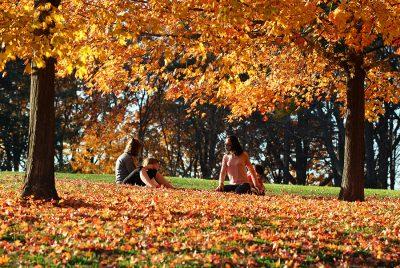If there’s ever a time for large gatherings, Thanksgiving is usually it. But this year, for the sake of public safety, the annual American tradition will likely look different at households across the country.

Families must take the proper precautions to protect themselves from COVID-19, including getting tested for COVID-19 and wearing masks, said Stephen Kissler, a postdoctoral research fellow at Harvard University’s T.H. Chan School of Public Health.
“If you’re used to having a really large family gathering, this might be a year to splinter that off into smaller gatherings,” Kissler said. “That just helps reduce the risk of having one of these major super-spreading events.”
Travelers are more likely to contract COVID-19 while waiting in airport security or riding public transportation to airports rather than inside the airplanes, Kissler said.
“Airplanes themselves are actually very safe places to be, given the cabin filters and the air exchange and the fact that people are generally expected to be masked,” Kissler said.
Kissler said Black Friday shoppers should consider making their purchases individually instead of in groups, as well as keeping a wide berth between themselves and other shoppers.
“The idea is to just try to reduce the number of people at these stores at any given time,” Kissler said. “That’ll help keep everyone safer, especially if everyone’s doing that.”
Kissler said while people should be cautious while going out in person, it’s important to support small businesses this holiday season, as they are the most affected by the pandemic. Shopping online is one way to support local businesses without the risks of in-person shopping.
Mary Ann Chirba, a professor at Boston College Law School, wrote in an email that staying home, shopping online and celebrating apart from one another are the best ways to stay healthy this holiday.
“This is a short term cost,” Chirba wrote. “View it as a down payment on many years of togetherness ahead.”
Chirba wrote “common sense based on science and data” will be key to making it through the pandemic, and that committing to COVID-19 health guidelines is a part of that journey.
“The emotional toll of spending the holidays apart is nothing when compared with the devastation of losing a family member to Covid,” Chirba wrote, “or suffering long hauler complications, or delaying non-Covid screenings and care due to an overburdened health care system.”
Noncompliance with public health guidance also disrespects the hard work of nurses and doctors, Chirba wrote.
Forty-six-year-old Jennifer Verstreken, an emergency room nurse living in Hyde Park, said she will celebrate without her family this Thanksgiving.
“Thanksgiving is my favorite holiday, the one where I’ve typically gathered with my dad’s side of the family,” Verstreken said. “I think back to antics with my cousins and sitting at the kids’ table. But my parents are in their early 70s and they live out of state, and I’m an ER nurse.”
She and her brother, a construction worker, decided to stay away from their parents this year, Verstreken said, because the two could be exposed to COVID-19 at work and then bring the virus to them.
“As a health-care worker, I understand the science of a pandemic, of a disease and transmission,” Verstreken said. “But then, as a human, I’m very frustrated with the rates of transmission and the methods of transmission.”
Verstreken’s Thanksgiving will be “untraditional,” she said, because she plans to celebrate with just her boyfriend and a video call to her parents.
“It might be slightly less ceremonial than a Thanksgiving table that you think of with rows and rows of pies and so many vegetable sides you can’t see straight,” Verstreken said. “It’ll be a quiet meal at home with the two of us and the dogs licking the plate.”




























































































































